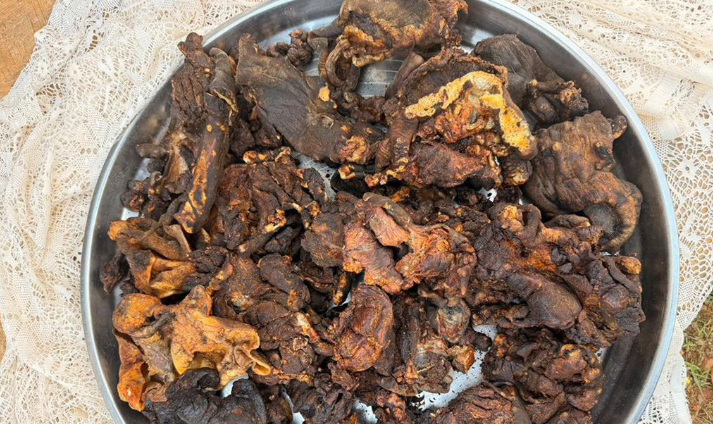
Wahala for Goat Meat: Butcher Accused of Turning Two Full Goats Into Mystery Meat Sparks Outrage Online

Social media has once again become the courtroom for public opinion after a user identified as @ScholarChefD, popularly known as EauDeFoodie, shared a shocking incident involving a butcher who allegedly mishandled an order of two full goats meant to be deboned and properly processed. According to the viral post, the butcher was left unsupervised to handle the task, but what was delivered in the end has sparked confusion, disbelief, and heated debate across social platforms.
In the now-trending post, EauDeFoodie lamented that what was supposed to be two full goats—excluding only the heads and legs—had somehow been reduced to a questionable pile of boneless meat that didn’t seem to add up in quantity or appearance. “These people left this butcher to lie and debone two whole goat meat unsupervised. This is supposed to be 2 full goats (Ogunfe) (boneless) by the way. Excluding the heads and legs,” the tweet read.
The post, which quickly gathered traction among food enthusiasts, meat sellers, and curious onlookers, drew reactions that ranged from pure amusement to outright fury. Many users questioned how such a large quantity of goat meat could appear so little after being processed, while others speculated that a significant portion might have been diverted before delivery. Some online commentators humorously referred to it as “The Case of the Missing Ogunfe,” turning the situation into yet another viral Nigerian-style drama about trust, honesty, and food.
As Nigerians know, goat meat—popularly called Ogunfe—is not just any type of meat. It’s a delicacy deeply woven into the fabric of Nigerian cuisine, often reserved for special occasions, Sunday soups, and festive events. From pepper soup to jollof accompaniments, goat meat is prized for its rich flavor and chewy texture. So when someone pays for two full goats, expectations are naturally high. That’s why this story hit a nerve with so many people online—because it’s not just about meat, it’s about trust, value, and the frustration of being shortchanged by service providers who underestimate their customers’ awareness.
One commenter under the viral post wrote, “Two full goats? And this is all you got? Na who dey supervise the supervisor?” Another user added, “You for weigh am before and after. Butchers dey always reduce meat like say dem dey take am pay rent.” The replies poured in like fire, with others sharing their personal experiences of similar disappointments.
It appears this kind of incident is not isolated. In Nigerian markets, especially during festive seasons, complaints about dishonest butchers or careless meat processing have become increasingly common. Many customers allege that butchers tend to shave off portions or mix cuts with lower-quality meat when unsupervised. The lack of standardized processing facilities or regulatory oversight in many local abattoirs leaves room for such inconsistencies to thrive.
However, the situation isn’t always so straightforward. A few defenders of the butcher industry chimed in, suggesting that the loss in quantity might be due to the nature of boneless meat itself. “Once you remove all bones and joints, meat volume drops sharply,” a user claimed, attempting to give the accused butcher the benefit of the doubt. “Two goats with bones can look plenty, but when you debone everything, what’s left might shock you.”
While that may be true, others still insisted that the outcome shared by EauDeFoodie looked far too small to have come from two full-grown goats. Some suggested that professional butchers or trained chefs should be present during such processing to avoid being cheated. “Next time, carry your own scale, stand there, and watch them. That’s how to avoid stories that touch,” another netizen advised.
Beyond the humor and outrage, this viral moment once again underscores a recurring Nigerian dilemma—how trust and accountability continue to erode in everyday transactions. Whether it’s mechanics, tailors, artisans, or butchers, many people have experienced situations where the service provided didn’t match what was promised. And in an economy where food prices have skyrocketed, losing even a small portion of what you paid for hits differently.
The online reaction has also evolved into a wider conversation about consumer rights and professionalism in Nigeria’s informal sector. Some food vendors and chefs online emphasized the need for better training and quality assurance among butchers, especially those who handle meat for restaurants, catering events, or resale. “There’s an art to butchering,” one chef tweeted. “If someone doesn’t know how to properly debone, you’ll lose both meat and money. You don’t leave that kind of job to just anybody.”
The post has since gone viral across multiple platforms, with memes and jokes emerging around the mysterious disappearance of the supposed “two goats.” Some have compared it to popular Nigerian metaphors about things vanishing mysteriously—“na village people collect the meat,” one user joked. Others shared edited photos of missing goat posters, adding humor to an otherwise frustrating experience.
Still, for EauDeFoodie, who appears to be both a passionate cook and food critic, the incident serves as a serious reminder about the importance of supervision and accountability in food handling. In follow-up comments, the user maintained that what was received could not possibly represent the volume expected from two full goats, regardless of how much bone was removed. “Even if you remove every bone, tendon, and joint, two goats can’t vanish like that,” they wrote. “Someone needs to explain where the rest of the meat went.”
In the broader sense, this episode highlights how social media has become a watchdog for everyday Nigerians. Many people now turn to platforms like X (formerly Twitter) to expose poor service, fraud, or incompetence. The instant visibility such posts gain often pressures vendors or service providers to maintain higher standards. However, it also reveals the thin line between fair criticism and public shaming, especially when all sides of the story aren’t fully explored.
Interestingly, several butchers and meat suppliers have since commented under the post, offering to assist EauDeFoodie with proper processing next time. A few even posted videos explaining how much meat typically comes out of two full goats, providing visual proof to help others understand the deboning process. While this helped clarify some misconceptions, the majority of commenters still sided with the belief that something fishy—perhaps literally—had gone down during the unsupervised processing.
At the end of the day, the story has become another classic Nigerian online moment—part outrage, part comedy, part life lesson. It reveals how a seemingly simple thing like deboning goat meat can ignite a nationwide conversation about integrity, oversight, and consumer vigilance. Whether the butcher genuinely made a mistake or something more suspicious occurred, one thing is clear: Nigerians will always have something to say when meat is involved.
And as one witty user summed it up perfectly under the viral post: “This one no be deboning, na dematerialization. Two goats enter abattoir, one small nylon come out. Wonders shall never end.”
For now, EauDeFoodie’s tweet remains a trending topic and a cautionary tale—proof that in today’s Nigeria, you don’t just pay for goat meat, you pay for supervision too.


